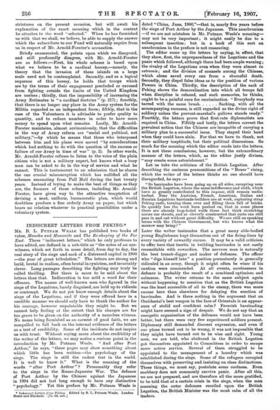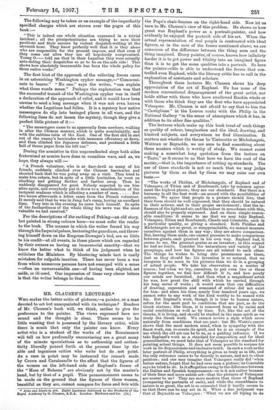INDISCREET LETTERS FROM PEKING.*
MR. B. L. PUTNAM WEALE has published two books of value, Manchu and Muscovite and The Re-shaping of the Far East. These "indiscreet letters," which he only professes to have edited, are defined in a sub-title as "the notes of an eye- witness, which set forth in some detail, from day to day, the real story of the siege and sack of a distressed capital in 1900 —the year of great tribulation." The letters are strong and lurid, brutal in realism, often brutal in cynicism, and invariably clever. Long passages describing the fighting may truly be called thrilling. But there is more to be said about the letters than that. Indiscretion is too mild a word for their 6ffences. The names of well-known men who figured in the siege of the Legations, barely disguised, are held up to ridicule or contempt. We do not yet know enough details about the siege of the Legations, and if they were offered here in a credible manner we should only have to thank the author for his courage, however unpalatable they might be. But we cannot help feeling at the outset that his charges are far too grave to be given on the authority of a nameless witness. No name being furnished as an earnest of good faith, we are compelled to fall back on the internal evidence of the letters as a test of credibility. Some of the incidents do not inspire us with trust. Without saying more about the credibility of the writer of the letters, we may notice a curious point in the introduction by Mr. Putnam Weale. "And after Port Arthur," he says, "these pages may show something about which little has been written—the psychology of the siege. The siege is still the rudest test in the world. It is well to know it." What is the meaning of the words "after Port Arthur" ? Presumably they refer to the siege in the Russo-Japanae War. The defence of Port Arthur by the Chinese against the Japanese in 1894 did not last long enough to have any distinctive "psychology." Yet this preface by Mr. Putnam Weale is • Indusereet Letters front Peking. Edited by B. L. Batman Weal& London Herat end Blackett. 1?". 8& net.] dated "China, June, 1900,"—that is, nearly five years before the siege of Port Arthur by the Japanese. This anachronism —if we are not mistaken in Mr. Putnam Weale's meaning— may not be very important ; it might easily be due to a subsequent insertion; but in a book of this sort an anachronism in the preface is not reassuring.
The editor sums up the letters by saying, in effect, that they show, first, the unpreparedness of the Legations and the panic which followed, although there bad been ample warning ; the rivalry of the Legations even when they were almost in extrentis ; and the division of counsels among the Chinese, which alone saved every one from a shameful death. Secondly, they dispel false ideas as to the position of various Powers in China. Thirdly, the description of the sack of Peking shows the demoralisation into which all troops fall when discipline is relaxed, and such memories, he thinks, ought to be a painful cure for recrimination. "Everybody was
tarred with the same brush Sacking, with all the accompanying excesses, is still regarded as the divine right of soldiery unless the provost-marshal's gallows stands ready." Fourthly, the letters prove that firat•rate diplomatists are required in China. Fifthly and lastly, the letters correct the prevalent notion that the Chinese are incapable of carrying a military plan to a successful issue. They stayed their hand when they could have slain. For that we have to thank, not their military ineptitude, but their political dissensions. So much for the meaning which the editor reads into the letters. It is not these conclusions, however, but the extraordinary manner of the letters, which, as the editor justly divines, "may create some astonishment."
Let us take the criticism of the British Legation. After describing the ominous premonitions of the " Boxer " rising, which the writer of the letters thinks no one should have disregarded, be says
"So barricades have been going up on all sides, excepting near the British Legation, where the same indifference and sloth, which have so greatly contributed to this impasse, still remain undis- turbed. Near the Austrian, French, American, Italian and Russian Legations barricade-builders are at work, capturing stray Peking carte, turning them over and filling them full of bricks. So quickly has the work been pushed on, that in some places there are already loop-holed walls three feet thick stretching across our streets, and so cleverly constructed that carts can still pass in and out without great difficulty. We are still on speaking terms with the Chinese Government, but who knows what the morrow may bring?"
Later the writer insinuates that a great many able-bodied young Englishmen kept themselves out of the firing-lines by every variety of cowardly excuse. It may be a valid criticism to offer here that inertia in building barricades is not easily reconcilable with cowardice. The nervous man is naturally the best trench-digger and maker of defences. The officer who "digs himself into" a position prematurely is generally ridiculed in an army, though it might often be wiser if his caution were commended. At all events, carelessness in defence is probably the result of a combined optimism and calmness. The writer returns to the same subject again without happening to mention that as the British Legation was the least accessible of all to the enemy, there was more excuse here than elsewhere for delaying the erection of barricades. And is there nothing in the argument that an Occidental's best weapon in the face of Orientals is an appear- ance of stolid and confident calm ? Feverish barricading might have seemed a sign of despair. We do not say that an energetic organisation of the defences would not have been better, but there were very few experienced soldiers present. Diplomacy still demanded discreet expression, and even if our plans turned out to be wrong, it was not impossible that they might have turned out to be wise and right. Young men, we are told, who sheltered in the British Legation got themselves appointed to Committees in order to escape more active service. Several of them struggled to be appointed to the management of a laundry which was established during the siege. Some of the refugees occupied themselves with preserving and insisting on class distinctions. These things, we must say, postulate some coolness. Even snobbery does not commonly survive panic. After all this, we are not prepared, and are therefore all the more gratified, to be told that at a certain crisis in the siege, when the men manning the outer defences recoiled upon the British Legation, the British Minister was the most calm of all the leaders,
The following may be taken as an example of the imperfectly specified charges which are strewn over the pages of this book :—
"This is indeed our whole situation expressed in a trivial incident ; all the plenipotentiaries are trying to save their positions and their careers by violent despatch-writing at the eleventh hour. They know perfectly well that it is they alone who are responsible for the present impasse, and that even if they come out alive they are all hopelessly compromised. Young 0— told me that in their Legation they were actually ante-dating their despatches so as to be on the safe side ! This shows how absolutely inexcusable has been the whole policy for three entire weeks."
The first hint of the approach of the relieving forces came in an astonishing Washington cypher message,—" Communi- cate to bearer." "No one," says the writer, "can explain what these words mean." Perhaps the explanation was that the successful transit of the Washington cypher was in itself a declaration of the approach of relief, and it would have been unwise to send a long message when it was not even known whether the Legations had fallen. It is a mystery how native messengers do slip into besieged places in all wars, and the following lines do not lessen the mystery, though they give a perfect little picture of it :— " The messengers came to us apparently from nowhere, walking in after the Chinese manner, which is quite nonchalantly, and with the sublime Calm of the East. One of the first slid in and out of the enemy's barricades with immense effrontery at dawn, and then climbed the Japanese defences, and produced a little ball of tissue paper from his left ear."
During the armistice in this unprecedented siege both sides fraternised as armies have done in countless wars, and as, we Lope, they always will :—
"I French volunteer, who is as dare-devil as many of his friends, suddenly climbed over the Chinese barricades and shouted back that he was going away on a visit. They tried to make him return, but in spite of a little hesitation, he went on climbing and getting farther and farther away. Then he suddenly disappeared for good. Nobody expected to see him alive again, and everybody put it down to a manifestation of the
incipient madness which is affecting a number of men lint two hours afterwards a letter came from the French volunteer. It merely said that he was in Jung Lies camp, having an excellent time. Very late in the evening he came back himself. In spite of the foolhardiness of the whole thing his news was the most valuable we had received."
For the descriptions of the sacking of Peking—an old story, but painted in strong colours here—we must refer the reader to the book. The manner in which the writer forced his way through the Imperial palace, hectoring the guardians, and throw- ing himself down on the Empress-Dowager's bed, are so little to his credit—at all events, in these places which are regarded by their owners as having an immemorial sanctity—that we know the better what to think of his judgment when he criticises the Ministers. By blustering minds tact is easily mistaken for culpable inaction. There has never been a war from which numerous persons have not emerged with a sense —often an unwarrantable one—of having been slighted, set aside, or ill-used. Our impression of these very clever letters is that the writer belongs to that class.







































 Previous page
Previous page